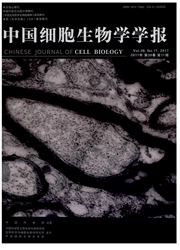

 中文摘要:
中文摘要:
目的:探讨AHNAK2蛋白在食管鳞状细胞癌中的表达情况及其对预后判断的意义。方法:应用组织微阵列免疫组织化学技术(TMA-IHC)研究129例食管鳞状细胞癌中AHNAK2蛋白的表达情况及其与临床病理指标之间的相关性。结果:AHNAK2蛋白在食管鳞癌组织中的表达率显著高于癌旁组织(P=0.023),不表达、弱表达、中度表达和强表达的肿瘤比例分别为24.8%(32/129)、28.7%(37/129)、17.0%(22/129)和29.5%(38/129),且随着分化程度的升高,该蛋白的表达率也随之增高(P=0.004)。Kaplan-Meier生存分析显示, AHNAK2蛋白表达阴性患者术后生存时间短于表达阳性的患者(P=0.027)。通过多因素回归分析发现, AHNAK2蛋白是一个独立预后因素(P=0.018,HR=0.461,95%CI:0.243~0.877)。结论:AHNAK2蛋白在食管鳞癌中表达上调,且与分化程度相关,有可能作为食管鳞癌预后判断的分子标志物。
 英文摘要:
英文摘要:
OBJECTIVE:This study aimed to evaluate the expression and prognostic significance of AHNAK2 protein in esophageal squamous cell carcinoma (ESCC). METHODS:The alteration and clinical relevance of AHNAK2 protein levels were investigated in 129 ESCC cases by immunohistochemistry. RESULTS:The expression of AHNAK2 protein was up-regulated in some of ESCC tissues. Negative,weak,moderate and high expression of AHNAK2 were observed in 24.8% (32/129),28.7% (37/129),17.0% (22/129),and 29.5% (38/129) of tumors,respectively. Positive expression of AHNAK2 was significantly correlated with tumor differentiation (P=0.004). Kaplan-Meier survival curves showed that ESCC patients with negative expression of AHNAK2 had shorter overall survival time (P=0.027). Cox regression analysis indicated that AHNAK2 protein expression was an independent prognostic factor (P=0.018,HR=0.461,95%CI:0.243-0.877). CONCLUSION:AHNAK2 was overexpressed in ESCC tissues and correlated with tumor differentiation. AHNAK2 expression might contribute to the prognostic evaluation of patients with this disease.
 同期刊论文项目
同期刊论文项目
 同项目期刊论文
同项目期刊论文
 期刊信息
期刊信息
